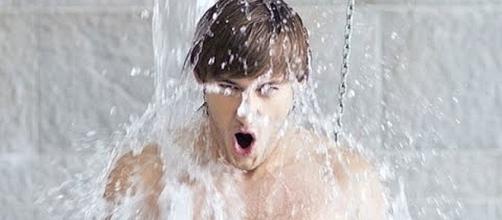For those with a powerful need for quasi-electrical interventions of one sort or another, reboots and renewals…
By
Fling wide the plastic curtain, take a breath, and step right in.
Here’s what used to happen.
I’d wake up, smoldering and sighing, reel out of bed and into the kitchen, and put the kettle on. Then I’d think: Well, now what? Time would go granular, like in a Jack Reacher novel, but less exciting. Five minutes at least until the kettle boils. Make a decision. Crack the laptop, read the news. Or stare murkily out the window. Unload the dishwasher? Oh dear. Is this life, this sour weight, this baggage of consciousness? What’s that smell? It’s futility, rising in fumes around me. And all this before 7 a.m.
Here’s what happens now.
I wake up, smoldering and sighing, reel out of bed and into the kitchen, and put the kettle on. And then I have a cold shower.
I don’t want to go overboard here, reader. Life-changing, neurosis-canceling, enlightenment at the twist of a tap—I don’t want to make these claims for the early-morning cold shower. But if like me you have a sluggish seam of depression in your nature, and a somewhat cramped brain, and a powerful need, throughout the day, for quasi-electrical interventions of one sort or another, reboots and renewals—or if you just want to wake up a little faster—can I most devoutly recommend that you give it a shot?
Then you get out, and you’re different. Things have happened to your neurotransmitters that may be associated, say the scientists, with elevated mood and increased alertness. You’re wide awake, at any rate. Your epidermis is cool and seal-like. Your nervous system is jangling—but melodically, like tiny bells. And from the kitchen, you can hear the kettle starting to whistle.
